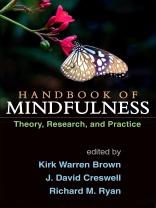This book has been replaced by
Handbook of Mindfulness, Second Edition, ISBN 978-1-4625-5700-4.
Das E-Book Handbook of Mindfulness wird angeboten von Guilford Publications und wurde mit folgenden Begriffen kategorisiert:
addiction;anxiety;attention system;Buddhist;chronic depression;cognitive;contemplative traditions;cross-cultural;depression;dysregulation disorders;emotional;interventions;mindfulness-based practice;mindfulness meditation;mindfulness science;perceptual processing;processing mode theory;self-control;self-determination theory;self-regulation;stress reduction
Cuprins
1. Introduction: The Evolution of Mindfulness Science, Kirk Warren Brown, J. David Creswell, & Richard M. Ryan
I. Historical and Conceptual Overview of Mindfulness
2. Buddhist Conceptualizations of Mindfulness, Rupert Gethin
3. Developing Attention and Decreasing Affective Bias: Toward a Cross-Cultural Cognitive Science of Mindfulness, Jake H. Davis & Evan Thompson
4. Reconceptualizing Mindfulness: The Psychological Principles of Attending in Mindfulness Practice and Their Role in Well-Being, James Carmody
II. Mindfulness in the Context of Contemporary Psychological Theory
5. Mindfulness in the Context of the Attention System, Yi-Yuan Tang & Michael I. Posner
6. Mindfulness in the Context of Processing Mode Theory, Edward R. Watkins
7. Being Aware and Functioning Fully: Mindfulness and Interest Taking within Self-Determination Theory, Edward L. Deci, Richard M. Ryan, Patricia P. Schultz, & Christopher P. Niemiec
8. Mindfulness in Contextual Cognitive-Behavioral Models, Thomas G. Szabo, Douglas M. Long, Matthieu Villatte & Steven C. Hayes
III. The Basic Science of Mindfulness
9. From Conceptualization to Operationalization of Mindfulness, Jordan T. Quaglia, Kirk Warren Brown, Emily K. Lindsay, J. David Creswell, & Robert J. Goodman
10. The Neurobiology of Mindfulness Meditation, Fadel Zeidan
11. Cognitive Benefits of Mindfulness Meditation, Marieke K. van Vugt
12. Emotional Benefits of Mindfulness, Joanna J. Arch & Lauren N. Landy
13. The Science of Presence: A Central Mediator of the Interpersonal Benefits of Mindfulness, Suzanne C. Parker, Benjamin W. Nelson, Elissa S. Epel, Daniel J. Siegel
14. Did the Buddha Have a Self?: No-Self, Self, and Mindfulness in Buddhist Thought and Western Psychologies, Richard M. Ryan & C. Scott Rigby
IV. Mindfulness Interventions for Healthy Populations
15. Mindfulness-Based Stress Reduction for Healthy Stressed Adults, Shauna L. Shapiro & Hooria Jazaieri
16. Mindfulness Training for Children and Adolescents: A State-of-the-Science Review, David S. Black
17. Mindfulness Training to Enhance Positive Functioning, Kirk Warren Brown
V. Mindfulness Interventions for Clinical Populations
18. Mindfulness Interventions for Undercontrolled and Overcontrolled Disorders, Thomas R. Lynch, Sophie A. Lazarus, & Jennifer S. Cheavens
19. Mindfulness-Based Cognitive Therapy for Chronic Depression, Julie Anne Irving, Norman A. S. Farb, & Zindel V. Segal
20. Mindfulness in the Treatment of Anxiety, Sarah A. Hayes-Skelton & Lauren P. Wadsworth
21. A Mindfulness-Based Approach to Addiction, Sarah Bowen, Cassandra Vieten, Katie Witkiewitz, & Haley Carroll
22. Mindfulness-Based Interventions for Physical Conditions: A Selective Review, Linda E. Carlson
23. Biological Pathways Linking Mindfulness with Health, J. David Creswell
Despre autor
.












